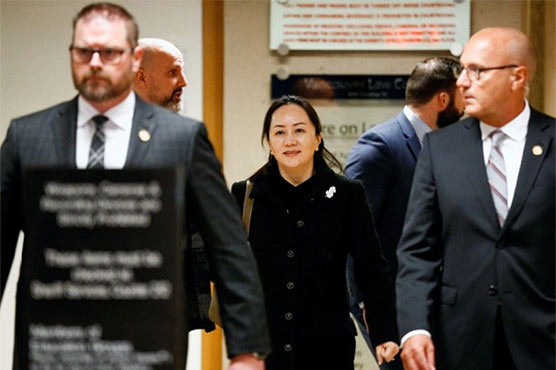Charges against Huawei exec 'fiction,' defense says at extradition hearing

Her attorneys in opening remarks rejected the fraud charges against Meng as "a fiction."
VANCOUVER, Jan 21, 2020 (AFP) - The Chinese telecommunications executive whose arrest in Vancouver badly strained Canada-China relations went to court on Monday to fight extradition to the United States, with her lawyers calling the accusations against her "fiction."
Meng Wanzhou, the chief financial officer of tech giant Huawei and eldest daughter of its founder Ren Zhengfei, is wanted by US authorities for alleged fraud.
Meng made no comment as she rushed past protesters waving "Free Meng" and "Trump stop bullying us" placards outside the British Columbia Supreme Court.
Inside, she sat quietly, following the proceedings with the help of an interpreter.
Her attorneys in opening remarks rejected the fraud charges against Meng as "a fiction."
"Sanctions drive this case," lead defense lawyer Richard Peck said, as Meng’s husband Liu Xiaozong and Chinese consular officials looked on from a packed public gallery.
"Would we be here in the absence of US sanctions? Our response is no," he said.
In order to secure her freedom, the "princess of Huawei," must convince Judge Heather Holmes that the US charges would not stand up in Canada and are politically motivated.
The US alleges Meng lied to HSBC Bank about Huawei’s relationship with its Iran-based affiliate Skycom, putting the bank at risk of violating US sanctions against Tehran.
Meng has denied the allegations. She has been out on bail, living in one of her two Vancouver mansions for the past year.
Lawyers for Canada’s attorney general on behalf of the US Justice Department have said they will justify extradition by arguing that the US accusations against Meng would be considered a crime in Canada if they had occurred here -- a key test known as double criminality.
On Monday, her defense team began arguing that her misrepresentations, if they occurred, do not amount to fraud, and that Canada had not matched the US sanctions against Iran.
"The US has cast (Meng’s) alleged behavior as a fraud against a bank. This is an artifice," Peck told the court.
"This case is founded on allegations of breach of US sanctions, which Canada has repudiated," he said, adding that Canada was effectively being asked "to enforce US sanctions."
He also argued that HSBC would not be prosecuted in Canada for unwittingly breaking the sanctions and so Meng’s actions caused no harm under its fraud definition.
In court documents, the Crown asserted that Huawei controlled the operations of Skycom in Iran; that its staff used Huawei email accounts and security badges; and its bank accounts were controlled by Huawei.
But Meng told HSBC executives in a presentation in 2013 that Huawei no longer owned Skycom and that she had resigned from that company’s board.
From 2010 to 2014, HSBC and its American subsidiary cleared more than US$100 million worth of transactions related to Skycom through the US.
‘Grave political incident’
Earlier, China’s foreign ministry called Meng’s extradition case a "grave political incident" and urged Ottawa to release the Huawei executive in order to normalize relations.
Canadian Deputy Prime Minister Chrystia Freeland responded that Ottawa "honors its extradition treaty commitments" and will not interfere in the case.
In a statement, Huawei said that it trusts Canada’s judicial system and believes Meng will be found innocent.
Meng’s arrest during a stopover of a Hong Kong-to-Mexico flight in December 2018 put the 47-year-old at the center of the US and China’s battle over the technology giant’s growing global reach.
It also stuck Canada in the middle of a trade row between the world’s two largest economies, resulting in China restricting agricultural imports from Canada.
Days after Meng was taken into custody, China arrested two Canadians on what Canada said were vague and trumped-up charges of "harming national security."
China’s "arbitrary detentions," according to Ottawa, of former Canadian diplomat Michael Kovrig and businessman Michael Spavor have been widely interpreted as retribution by Beijing aimed at pressuring Canada to free Meng.
The hearing in Vancouver is scheduled to last five days.
But if the US accusations are found to also be a crime in Canada, a further phase will follow in June, with the defense arguing that authorities conspired to nab Meng as part of a "covert criminal investigation."
Stunting Huawei’s rise
Ren Zhengfei has suggested that the case is part of a US plot to crush Huawei, seeing it as a security risk.
Prime Minister Justin Trudeau, who had hoped when he came to power in 2015 to deepen Canada’s economic ties with China, asked the US for help.
He told broadcaster TVA last month that he urged US President Donald Trump not to finalize a trade deal with China "that doesn’t settle the question of Meng Wanzhou and the two Canadians."
Trump went ahead, however, and signed a "phase one" trade deal with China last week.
Former Canadian leaders have urged Trudeau to simply release Meng in a "prisoner swap" for Spavor and Kovrig.
But extradition experts consulted by AFP say that would encourage what some called Beijing’s "hostage diplomacy" tactics.

